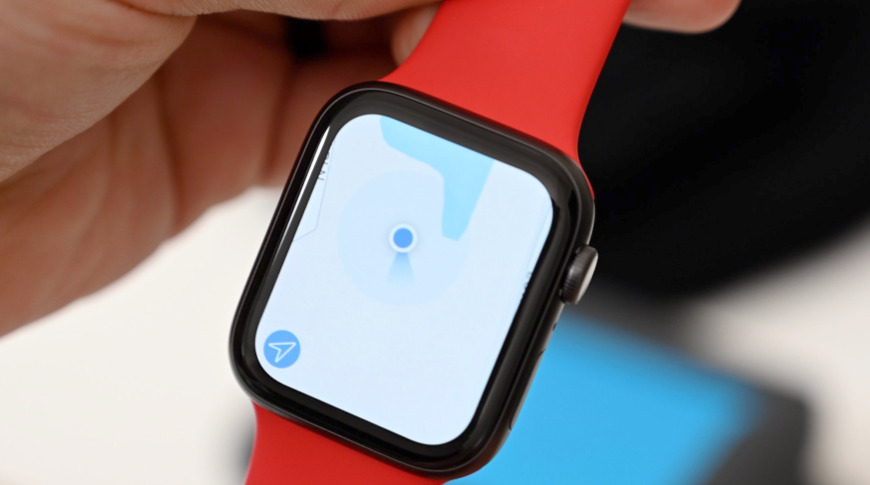Proposed new sensors in an Apple Watch, or other wearable device, could determine the presence, volume, and even toxicity, of water they are exposed to.
Among the myriad health features either currently in the Apple Watch or expected to be coming, there is a new one where the device may be able to detect water. If you're standing outside in the rain, it's likely that you'll notice you're wet just about as quickly as your Watch can, but this is about much more than whether you need an umbrella.
Apple's technology, should it come to fruition, could be used as a trigger, such as automatically launching Dark Sky or using that app's data to tell you when the rain will be over. However, the purpose here is to determine safety, not dampness.
"Portable electronic device as health companion," US Patent No 10,617,358, has future Apple Watches being able to detect water and also test it.
Initially, that test involves the amount of water involved — so the Watch will spot the difference between a light shower and you having fallen overboard from a ship. Next it could also check your calendar to see if you were going scuba diving today, among other information that could give the Watch "an anticipated context of use." Then it could analyze the water it detects, in order to determine whether it is safe to be exposed to.
"A particularly beneficial, but by no means only, use of the electronic device is one in which the electronic device determines that a body of water is nearby," says the patent, "and based upon an anticipated context of use, the electronic device can determine which properties of the water and/or surrounding environment would be relevant to the user and in particular the health of the user."
The patent is concerned with what could be used as a trigger. For instance, if the watch determines that the wearer has been exposed to "a significant body of water," it could trigger "a sensing element... [to] be used to detect properties of the water deemed to be of interest."
For instance, the Watch could tell the difference between fresh and salt water, then depending on the answer, it might deploy further tests. "For example, if the type of water is determined to be salt, a geo-location sensor can be used to determine a geo-location of the user that can be used to identify the body of water associated with the water sample," continues the patent.
So once water has been detected, an Apple Watch app could make the determination that the user is in trouble. Following that identification, it could notify emergency services of the wearer's location in the sea.
"Another sensor can be designed to detect bio-matter such as dangerous pathogens that if detected can trigger a warning to avoid entering the body of water or leave the body of water if already entered," it continues. "Another sensor could be used to detect chemicals in the water, and so on."
The patent takes some pains to detail how water on the top of the watch, such as rain, could be distinguished from water underneath it, specifically sweat. It also belabors how this patent application could apply to any number of devices, however its descriptions and drawings all refer to a Watch-like wearable device.
The patent is credited to four inventors, Steven P. Cardinali, William C. Lukens, Katharine E. Tong, and Trevor J. Ness. Cardinali was previously credited on another Apple Watch patent, this time regarding a Digital Crown that recognizes gestures. Tong's many patents include a recent one to do with using the Apple Pencil to trace 3D objects. And Ness was most recently listed as an inventor on a fingertip and face mapping system for VR and AR.
 William Gallagher
William Gallagher







-m.jpg)






 Charles Martin
Charles Martin


 Malcolm Owen
Malcolm Owen

 Christine McKee
Christine McKee
 Marko Zivkovic
Marko Zivkovic
 Mike Wuerthele
Mike Wuerthele









15 Comments
I want future Apple Watches to detect when the wearer is drunk and lock him out of his car.
Just imagine if this turned out to be a feature to automatically send a notification to Apple to invalidate the warranty due to water damage.
I have found Apple products are very water resistant. Last week I was on the dock and fell head first into the water. (No alcohol involved) Had to swim to the shore, about 3 min distance. I had my AirPods Pro in my ears, Apple Watch 4 on, and an iPhone XS in my pocket. Got to shore, took out the AirPods and rinsed everything. The watch and phone were fine, but I was sure the AirPods would be toast. Waited about an hour, put them back in my ears and they worked perfectly. Oh, did I mention it was saltwater?
I remember Apple haters arguing that Apple was "not innovative" because Google was "extending life". I guess one of Google's moonshot projects that never saw the light of day claimed this. Google always getting recognition for concepts while Apple always being ignored for shipped products. Or new features not being a big deal and ignored.
I wonder how many lives Apple Watch will save this year?
Apple products are pretty damn water resistant. Also they don't lie about their water resistant ratings (unlike Samsung). I doubt they'll void the warranty for an IP rated device.
Drowning happens very quickly. Hard to imagine a situation where a call gets to someone who can help and they are able to locate and retrieve the victim. Could make finding the body easier.